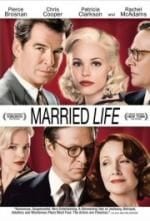
Ira Sachs’ Married Life has such an unusual hybrid of tones that it pains me to report how little of it actually works. The story, from a crime novel by John Bingham, is near-geometric in both its simplicity and its complications: In 1949, a husband (Chris Cooper) plots to murder his wife (Patricia Clarkson) so he can marry his mistress (Rachel McAdams) without causing his wife any (emotional) pain; his best friend and confidante (Pierce Brosnan), meanwhile, develops eyes for the mistress, too.
The telling is tidy in that not enough happens to allow for loose ends, but careless in its appropriation of suspense, deadpan comedy, and domestic drama. The Coen Brothers or Woody Allen could mix this cocktail in their sleep; there’s no fixed recipe, but Sachs overstirs his ingredients, slowly, until little flavor remains.
You can taste the old movies throughout, though, both in the movie’s staid style and through its characters, who are often seen watching melodramas on their old-timey TV sets. The presence becomes ghostly; you can almost see a more interesting old noir unfolding underneath this gloss, or semi-parody, or whatever Sachs is going for. There’s some offbeat cleverness to the idea that Cooper truly loves his mistress while his wife equates love with sex rather than sentiment, and there’s certainly dark humor in his desire to spare his wife trauma by discreetly murdering her. But, moving slowly and accompanied by a hushed Brosnan narration, the movie is buttoned-up to a fault, never closer than tongue-near-cheek.
That struggle is further indicated on the DVD commentary by Sachs, who acknowledges the material’s tonal trickiness while presuming that he and his collaborators found the right balance (the lack of Cooper, Brosnan, McAdams, or Clarkson — talented all — in the supplemental materials is consistent with their lack of presence in the film). Sachs speaks about finding the movie through simplification, but Married Life is so simple that it fails to justify itself. Character-driven movies are arguably closer in scope to short fiction than longer novels; quite a trick, then, that Married Life scales a novel back into a screenplay that in turn feels like a short story stretched out.
The most interesting extra on the disc is a trio of alternate endings, also with commentary by Sachs. The endings are substantial chunks of film, not just hasty reshoots; they are all variations on a flash-forward to the late ’60s that’s entirely omitted from the final cut of the movie. The differences are in their degrees of ironic tragedy, ranging from intense to nonexistent.
Sachs considers the test-screening process instrumental in his (or someone’s) decision to end the film earlier. He concludes that the darker material didn’t fit with his delicate tone; it probably doesn’t, but the darker endings’ disruption of the movie’s uniform lethargy is welcome. Ending number two, about halfway between the extended melodrama of ending number one and the semi-pointless openness of ending number three, is a microcosm of “just right” that the movie itself bypasses on the road to simplicity.

![Call for Papers: All Things Reconsidered [MUSIC] May-August 2024](https://www.popmatters.com/wp-content/uploads/2024/04/all-things-reconsidered-call-music-may-2024-720x380.jpg)



